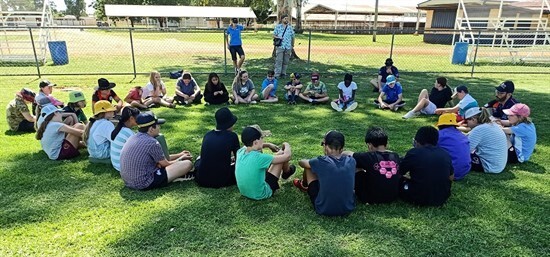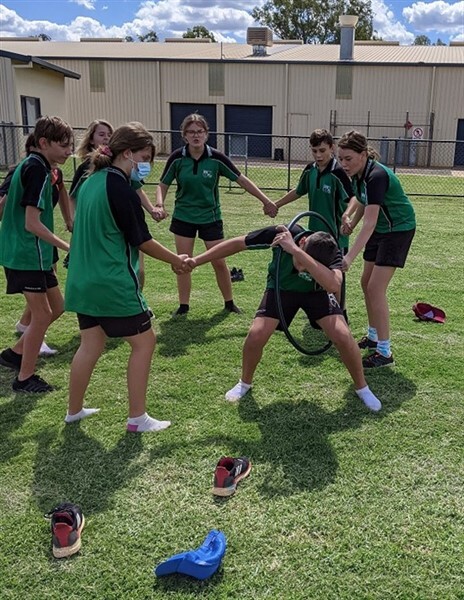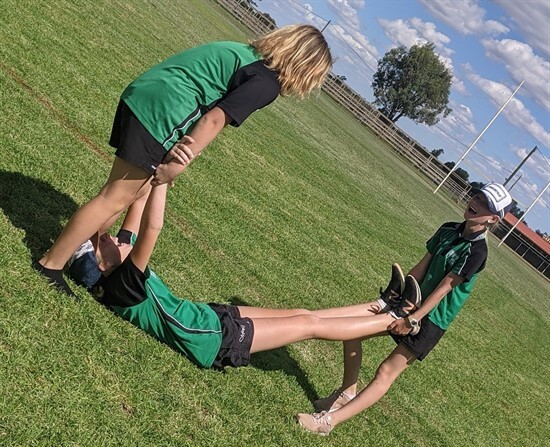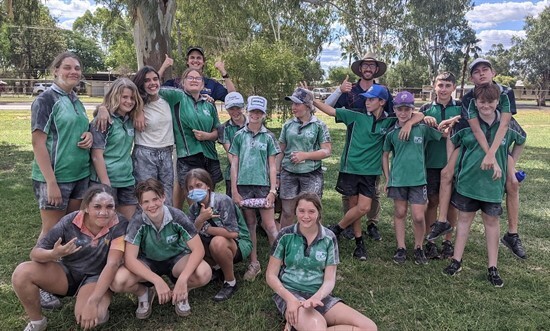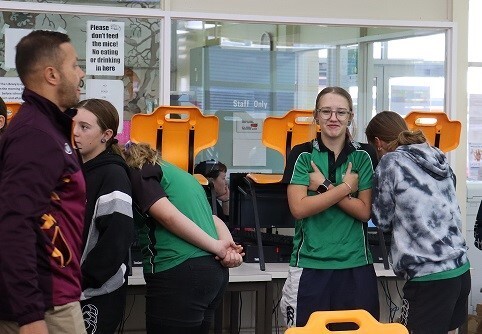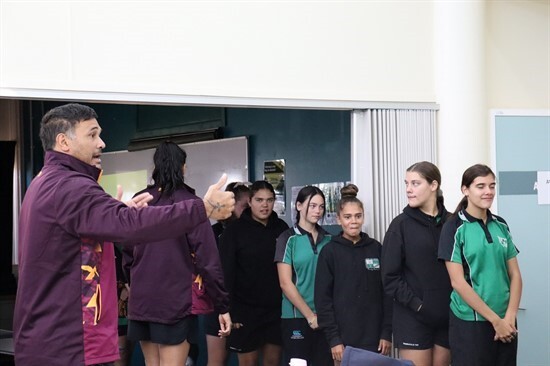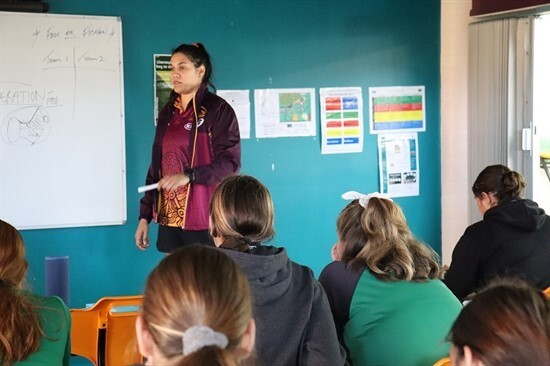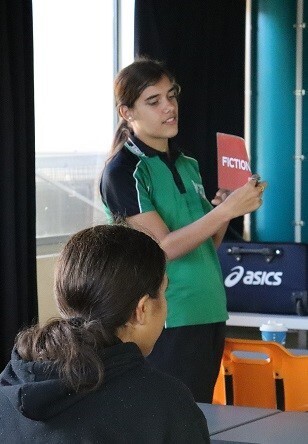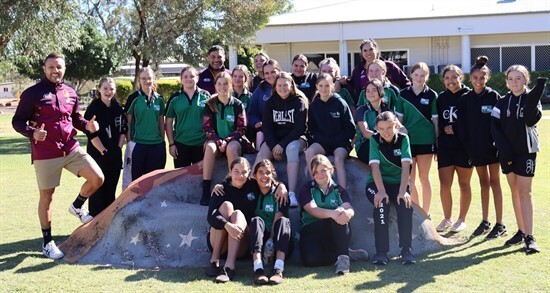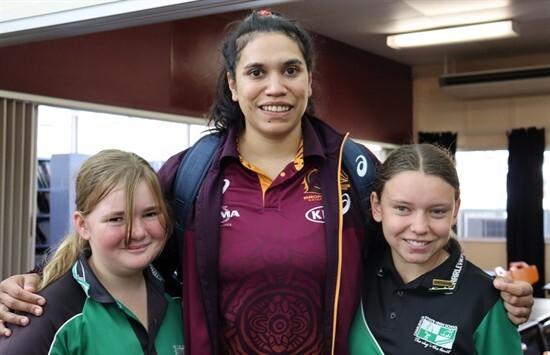12 May 2021
Newsletter Articles
Principal’s Note

Welcome to week 4 of Term 2! We are now moving through a very important phase of the learning cycle as staff and students focus in on the core elements of the units they are current studying. This is the period where organisation around preparing for assessment can make such a significant difference to academic performance as well as reducing any anxiety that students may feel when several subjects have assessments due around the same time.
By checking the assessment calendar (available on our website) and mapping out timing students will be in greater control of their learning. Also, an excellent time to check in with teachers if there are any upcoming events that may impact assessment as well as advising of any learning challenges. Always best for students to talk to their teachers first by asking questions during class, attending homework club or making a time to meet. The overall aim is to empower students to take control of their learning, the role of parents and caregivers in this is vital and always appreciated!

Year 7&8 Humanities students hard at work preparing for their assessment
NAPLAN
Over the next two weeks NAPLAN (National Assessment Program Literacy and Numeracy) will be undertaken by our Year 7 and Year 9 students. Our approach at Charleville SHS is that this is a normal part of school routine and the only expectation we have of our students is to have a go and do their best. We do not interrupt the delivery of the Australian Curriculum to incorporate NAPLAN preparation lessons, rather we focus on teaching the fundamental skills that are contained within the curriculum.
The information that becomes available when released later in the year is used as one, long term, data source to track our progress as we focus on continuous improvement. Shorter term data sets that we use include academic performance (Levels of Achievement or LOA’s), attendance and behaviour while the medium-term data incorporates information such as PAT-R (Reading) and Pat-M (Mathematics) to show annual gains. As Principal I, and the leadership team, are constantly reviewing our work to ensure we are on track with our improvement agenda, NAPLAN is simply one element that supports this process.
2020 Headline Indicator Data
Each year I receive a report, Headline Indicator Data, that includes information focused on key aspects of our learning progress across all year levels. The 2020 report shows some pleasing outcomes as well as aspects to maintain our efforts around improvement. For example, our Year 12 attainment which includes the Queensland Certificate of Education, Vocational Education (Certificates) and academic results shows us achieving in the highest category. We are also doing well overall in Maths and Science and improving our percentage of students achieving A’s and B’s in English.
The clear area of focus, however, continues to be on English overall, particularly in regard to our A-C percentages. We are definitely improving with particularly pleasing results in Term 1 in Years 7, 8 and 9. Year 8 students, for example, increased their A-C results by 15% compared to Semester 2 last year. To support English outcomes Literacy (Reading) is a key element of our Explicit Improvement Agenda with the school also investing in a Literacy Coach who oversees our targeted intervention programs such as Multi-Lit and Levelled Literacy Intervention.
The literacy coach also leads the implementation of Directed Reading and Thinking Activities (DRTA) which is our tier one strategy to support student literacy outcomes. Through this sharp focus on reading we aim to improve learning outcomes across all subjects and this will continue to be a core commitment moving forward.
In closing
Each week I have the privilege of spending time in class rooms, observing the great work that so many of our students consistently produce. I also see the efforts of my staff in supporting our students, often seeing them talking to children during break times about class work or just connecting with them to ensure positive learning relationships are formed and maintained. This is at the heart of what schools aim to achieve, enhancing learning outcomes through a positive environment.
The contribution of the community towards this cannot be overstated and I thank you for your continued support which is visible through students being prepared for their learning. Having the correct uniform and materials for classes is just one aspect, the encouragement and focus on achieving your best is so important and as I mentioned earlier the benefit is for students to work hard and take control of their learning, ultimately it is their journey.
All the best,

Barry Wallett
DEPUTY PRINCIPAL SENIOR SCHOOLING
What is an AARA and does my student need one?
For students in year 11 and 12, it is vitally important that they complete assessment (either assignments or exams) on or before the designated date. Where this is not possible for reasons outside of the student’s control, an AARA might be needed.
An AARA is an “Access Arrangement and Reasonable Adjustment” to an assessment and can be used for students with long-term medical conditions or disabilities, short-term conditions such as injuries, or for unexpected incidents such as illness or misadventure (including natural disasters or other events that could not be controlled).
Long-term AARA’s will be completed at the beginning of the year in consultation with the parents and students involved. Once these are approved by the QCAA students will be provided with the agreed adjustments for the approved assessments.
It is important to note that students are not eligible for an AARA for the following reasons: in situations where the student or parent have chosen to be absent during a scheduled assessment (such as family holidays or sporting events). Also, students will not be eligible for an AARA in situations where they have misread an exam timetable or instructions.
When a situation occurs that requires an AARA for our year senior students (such as earlier this year when roads were cut due to rain), an AARA application is completed and includes all of the relevant information. If a student is absent due to illness and supplies a medical certificate, the application can be completed. If there is an accident on the way to school and some evidence is provided, the application can be completed. Where there are sufficient grounds an AARA will be approved and this will usually result in a student being able to sit a comparable exam when they are able to return to school or being granted an extension for an assignment if they have been unable to attend school during an assessment period. The QCAA is responsible for approving AARA’s for students completing their summative assessment in year 12.
Students need to make every effort to complete their assessment on time, however where it is not possible, they need to ensure they communicate with their teacher and the HOD as early as possible around their situation. If an AARA is needed, an application will be completed by the school in consultation with parents and the student.
Where an AARA has not been completed, only evidence submitted prior to the due date may be marked which may adversely affect the student’s outcome.
Cassandra Kohli
Deputy Principal
Global Competence Program
Do our students have the skills they need to engage globally?
We know that global engagement is important and we want our students to think about a broad range of cultures and people. We want our students to know about the world beyond Charleville and Australia’s shores, and to be able to effectively connect and communicate with people around the world.
We also want our staff to be confident with their ability to develop globally competent citizens of our students. Our students have been, and will continue to be, at the forefront of challenges happening locally and globally, such as climate issues and social issues, not to mention dealing with a pandemic. Our world and the way we live, learn and work is changing constantly, and the knowledge, skills, and attitudes needed to be responsive to changes, challenges and people are essential.
Early in 2021 Charleville State High School was invited to participate in Phase 2 of the Global Competence Program Pilot. As educators, there are tangible things teachers can do so young people can make sense of their world and are set up for success in all areas of life. Although many attitudes and dispositions are formed in the family home, this program aims to help schools with this critical work.
Through this program, our school will:
- develop a better understanding of global competence and how to animate it in the classroom and across the school
- test the DEi Global Competence Framework over the course of the pilot program,
- connect and collaborate with other schools participating in the pilot program
- contribute to research being done by CQUniversity
We look forward to bringing this essential initiative into the school in a seamless and integrated way.
Sebastian Kohli
Junior Schooling
Welcome to week 4 and what a busy time of the term it is. There are many different activities happening across our wonderful school.
Year 7 and 9 Students: NAPLAN (National Assessment Program – Literacy and Numeracy)
If you have a student in Year 7 or 9 they will be sitting the NAPLAN tests starting this week. This year, our students will be sitting for NAPLAN ONLINE. NAPLAN ONLINE is conducted over a two-week period beginning on Tuesday May 11. The students have had a number of practice sessions and appear to be quite comfortable with the process.
The National Assessment Program – Literacy and Numeracy (NAPLAN) tests were first implemented in May 2008 when national tests were held in literacy and numeracy for all students in Australia in Years 3, 5, 7 and 9.
What do students need to do?
Relax. There is no need to be anxious. Diagnostic tests help inform the school on areas that need to be focused. Students need to try their hardest, focus on their own work and turn up to each exam on time. The students will sit for NAPLAN online in the Computer rooms using the desktop computers in the Trade Training centre. Both year levels have been preparing across Term 1. For further information about NAPLAN and the tests please do not hesitate to contact the school.
IMMUNISATION
- During week 4, the Tackle Flu program took place providing influenza vaccinations to all our indigenous students. Thanks to RFDS for their support.
- Flu vaccinations were extended to all our senior students. Thank you to South West Hospital for their support.
- And thanks to Jen Frazer our school nurse for her organization and support with these programs.
- Towards the end of May all staff will have the opportunity to receive their flu vaccinations.
SCHOOL GROUNDS
For safety reasons, please be aware that unless supervised, students/children are not allowed on school grounds outside of school hours.
Study /Homework Group
Study/ homework group meets on a Thursday afternoon for all students. Students interested in attending this session need to their parents sign off on the Global Permission form.
Thank you for your continued support of your student, the school and the educational process. If you would like any further information regarding the topics above please don’t hesitate to contact the school. Together we can make a difference in the lives of our future leaders.
Tips for talking to your child about school…
‘How was school today?’ STUDENT: ‘OK.’
Every afternoon, parents across Australia get the same frustrating one-word answer. Here are some ideas to get your child talking about school.
Why talking about school is hard:
‘How was school?’ is a big question. To answer, your child has to sum up a whole day, and that’s hard for kids (and even grown-ups!) to do.
ed with ideas and classes and social stuff that I don’t know where to start’. So, it’s easier just to say, ‘OK’.
Why talking about school is important:
Talking with your child about the school day shows you’re interested in what’s going on in their life. This interest boosts their mental health, happiness and wellbeing. It can also have a very positive effect on your child’s behaviour and achievement. It shows your child that you value school and education, which encourages them to value it too.
Talking together about school also helps you get to know more about what’s expected of your child at school, how they learn and how they handle challenges. It can help you understand when they’re feeling less interested in school or experiencing problems.
When you’re in touch with your child’s feelings about school, you’re more likely to see problems when they’re molehills, not mountains. This way you can work on overcoming challenges together.
And talking about school issues – such as school projects or friendship problems – is also a great chance for you to express your family values about things like teamwork, respect for self and others, friendships, relationships, problem-solving and so on.
Ideas for talking about school with secondary school children
As they develop into the teenage years, your child might want more privacy and time to them self, which can make it harder to talk about school. But this isn’t the end of your warm, close relationship – it’s just that getting some distance from you is how your child becomes a more independent individual.
Another conversation starter with your child would be to ask them about the four Learning Objectives. Each lesson in the school begins with the students acknowledging the Learning objective. It gives the student a clear understanding of what they will be learning in the following 70 minutes. If you are also aware of the Learning objective you will be able to discuss exactly what the student is learning in class rather than receiving the usual teenage response of “Nothing” or “Not Much”.
Simple, positive and specific questions about parts of the day can get your child talking. For example:
- What’s the news from school today?
- What was fun?
- What did you like best at school today?
- What does your classroom look like at the moment?
- Who did you hang out with today?
- What subjects did you do today?
- What projects are you working on at the moment?
Look out for signs of problems
Even if you usually have a good relationship with your child, they might not always tell you when they’re having a tough time. If they are upset or nervous about discussing school or refuses to answer a question, there might be a bigger problem.
If you’re worried, you could try talking to other adults who know your child. Contacting the school or other appropriate professionals might help too.
Stay calm around tricky topics
Conversations with your teenage child about school might bring up tricky topics. Try to stay calm – this is a great chance for you to be supportive. If your child doesn’t want to talk to you about a tricky topic, they might chat with someone else – another parent (especially of the same gender, if it’s a personal issue), a trusted relative or friend, or a school counsellor.
Happy learning,
Anna Batstone
HOD Teaching and Learning
A/ Deputy Principal
Helping Kids with the Ups and Downs of Friendships
It is not always easy for adolescents to know how to manage friendships. Problems with friends can affect how adolescents feel about themselves and their enthusiasm for activities that involve others.
Parents and carers can help adolescents learn the kinds of friendship skills they will need as they grow and develop.
Learning how to make and keep friends involves a number of skills. Adolescents learn more and more complex social skills from those around them as they develop.
Home life has an effect on the development of social skills. A teenager who has an adoring little sister is likely to have more skills of leadership. A teenager who is the little sister may be more used to fitting in with what others want to do. These adolescents are likely to react differently when they go to school and meet other adolescents with different life experiences and different social skills.
Friendship skills for Adolescents include:
- Cooperation - how to share, to take turns, to work together towards a common goal
- Communication - using words to explain what you want and listening to others respectfully; paying attention to body language, e.g. making eye contact, smiling and being able to read others’ nonverbal reactions;
- Understanding and managing feelings - being able to express feelings in ways that help others understand you; recognising and responding to others’ feelings; and
- Tolerance - Accepting and including others - recognising others’ needs for respect and friendship.
How Parents and Carers can help:
Be aware of feelings. Adolescents need to learn that having angry feelings is normal and okay, but that reacting aggressively towards others when you’re angry is not. Adults can help adolescents become aware of feeling annoyed, frustrated, angry or furious by naming feelings. Learning to say, “I’m feeling angry” or “I’m really frustrated” gives adolescents a way to separate feeling angry from how they react.
Time to talk
Talking to Johnny about what has put him in an angry mood will help him see that feelings have causes and that solutions can be found. Once you find out what he was angry about you can help him think up better ways to handle the problem. This kind of conversation doesn’t work while he is really angry. Sometimes it must wait until later.
Adolescents often find it easier to talk in informal situations where they feel less pressure. Find a relaxed time to talk to adolescents about feelings. Asking, “What makes you angry?” can be a good way of starting a conversation about anger.
Find alternatives
Getting adolescents to think through a difficult situation helps them develop problem solving skills. Asking, “Is that what you wanted to happen?” or “What else could you have tried?” encourages an adolescent’s with helpful thinking skills. Thinking of alternative solutions helps adolescents plan different ways of reacting next time. Be sure to praise their efforts.
Have ways to calm down
When emotions are strong, it is easy to act without thinking. Encourage your teenager to take control and allow time for the emotions to subside by trying one of the following: practising breathing, walking away, using a quiet spot to think, riding a bike, listening to music or talking to the family pet.
Try a ‘Problem Solving’ Approach
When problems arise in friendships it is important not to blame adolescents but to show them how to find a solution. A ‘problem solving’ approach is often helpful.
- Encourage your child to describe what has happened
- Ask about how they felt
- Ask them how they think the other person might see it and how they might be feeling
- Get them to think of ways they could do things differently next time
- Encourage them to try the new approach – get them to practise with you so they feel more confident
- Check back with your child to see how things turned out
As parents our job is to help our adolescents to develop skills that will, not only serve them well, but also skills that they can pass onto their children.
If I can help you or you need to talk about anything, contact the Charleville State High School support team by phone on 4656 8888.
Sharon Grosskopf, Guidance Officer
email: sgros15@eq.edu.au
Emu Gully Camp
Our Year 7 & 8’s enjoyed an event run by the Emu Gully people.




Year 8 Activities
Beyond Broncos





2021 Workshop at Charleville SHS

Coming to Charleville:

Charleville Race Day



